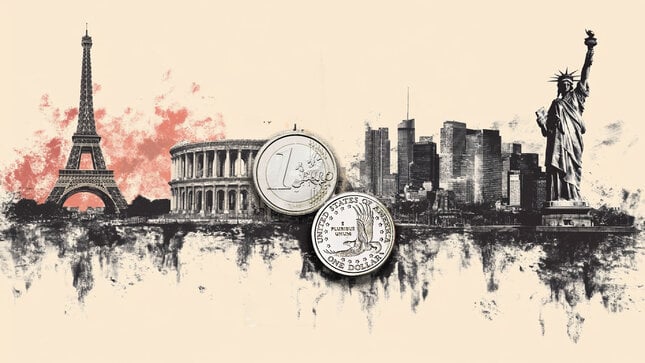The adage "don't put all your eggs in one basket" hinges on the fact that if you drop that one basket, all your eggs as smashed. On the other hand, if you were carrying four baskets - you’d still have three left if you’d dropped one. Spreading out your assets is a good way to reduce that risk.
That’s the principle we’re going to discuss and why using this adage in the context of investment demonstrates the importance of diversification.
By spreading capital across various investment kinds and businesses, diversification strives to boost returns and reduce overall risk. Understanding the importance of diversity in the investment industry is essential, whether you want to be a portfolio manager or just want to learn more about how your money is invested.
What's the point of having a diverse portfolio?
When two or more assets move in opposite directions in the same setting or scenario, they often complement each other. If you hold just one asset, you do not get the gain from the others.
It doesn't matter what kind of risk the individual investments in your portfolio have; by combining them, you can lower the overall risk of your portfolio.
Let’s imagine that you wanted to put your money into two fresh stocks.
You read about how well Zoom is doing, and decide that videoconferencing platforms of the future, so you buy shares in a leading rival you think has more growth potential.
Let’s call this investment one.
You also see that Amazon is doing well because the pandemic has meant that more people have been ordering stuff online – and that needs to be delivered. You decide to buy shares in a logistics company delivering parcels.
This is investment two.
Individually, both stocks might be considered risky. But because they are in completely different sectors, you
Rather than piling all of your capital into one stock, you “hedge your bets.”
Investment one's stock price may fall if there is a gas shortage and the company cannot deliver packages. Investment two's stock price, on the other hand, could rise because videoconferencing is not affected by a gas crisis.
Even if some people decide to work from home because of the gas scarcity, they may opt to buy the videoconferencing platform, which might lead to a correlation between the performance of investment two and that of investment one.
For the sake of mitigating risk, you're separating your "eggs" (money) into different "baskets."
Investing in a wide range of assets within a single asset class is a good starting point where we use diversification. This can be as simple as purchasing an index fund, such as the S&P 500 or the Russell 2000, to guarantee that your portfolio includes both high- and low-risk equities from various industries.
Consciously investing in industries that appear to relate to one another can also be complementary - say, investing in a print company, an ink manufacturer, and a paper producer.
Second, consider expanding your search to include countries outside of the U.S. You can limit risk and balance your portfolio by investing in international markets if your country's market were to perform poorly. Keep in mind that the rules, regulations, and procedures for investing in foreign nations may differ from your own.
By investing in a variety of asset types, another technique is to diversify one's portfolio. It's possible to invest in the public market through traditional means, such as stock or bond holdings or money market funds, or in an unregulated manner using, “alternative investments.”
Traditional investments can benefit from the addition of such alternative investments because of their strong complementarity. An alternative investment can help to diversify portfolios even further.
Any investment that isn't stock, bond, or cash is an alternative investment. Alternative investments are difficult to convert into fiat currency, and they are not subject to SEC oversight (SEC).
Here are a few alternative investments:
- In order to beat the market's return, a group of investors pool their money and invest it across a variety of securities in so-called "hedge funds."
- Private equity, which includes venture capital, growth equity, and buyouts, is the investment of capital in private firms.
- Real estate, is the investment of capital in residential, commercial, or retail properties, either personally or through a real estate venture fund or investment trust..
- Derivative investment is where money is put toward a privately held company's debt that is either distressed or private.
- Commodities - these are natural resources like oil, agricultural products, or timber in which capital is invested.
- Collectibles, such as fine wines, vintage automobiles, and baseball cards, are bought hoping to resell them at a profit later on.
- Fixed-income markets and derivatives are involved in the creation of structured products.
Because of their low correlation with traditional assets, alternative investments are an excellent addition to portfolios. Your alternative investments could perform well even if the stock market is down.
As they do not trade these investments on the open market, provide an excellent opportunity to broaden your portfolio's diversification.
These assets are all part of the alternative investing asset class, which includes a wide range of options. There's no one-size-fits-all answer to this question. There are a number of things to consider. To make sure your portfolio is well-diversified, contrast each alternative investment with the more traditional ones.
How long an investor expects to keep an investment is known as the time-horizon.
Time horizons range from a few hours to a few decades, depending on the individual. If an investment has a long time horizon, it will be illiquid until it achieves maturity because of the link between liquidity and the time-horizon.
It's unnecessary to have a time horizon in mind while investing in traditional assets like stocks, bonds, and cash. Investors have the option of selling their investments at any time.
Alternative investments have a longer time horizon and are less liquid - time horizons are established when a contract is signed, such as when a person joins a private equity firm as a limited partner. Others are long because they're tough to sell or take a long time to appreciate in value.
Here are some time horizons:
- Hedge funds: The time horizons of hedge funds can be extremely short (a few seconds) to somewhat extended (weeks or months) (a few years).
- Private equity: The average time horizon of a private equity investment is ten years.
- Real estate: Institutional investors keep real estate investments in their portfolios for nearly eight years, on average. Individual investors in real estate aren't bound by a defined time frame, but the market's performance can make it tough to sell a property quickly.
- Because of the length of time necessary for commodities and collectibles to accumulate value, investors need to plan ahead when purchasing any of these asset classes. To know when to sell your asset, you need to monitor the market's cycles and levels.
For investors, a wide range of time horizons and liquidity is essential to a well-balanced portfolio.
You can also select investments from a variety of businesses and markets in order to diversify your portfolio.
Examine industry trends for private companies you're contemplating investing in, and choose businesses in industries where there is a high level of synergy.
Diversify your real estate holdings by investing in a variety of property types or geographic regions when thinking about making an investment in real estate.
The purpose of diversification is to spread out the risk, and alternative investments offer a variety of risk levels to consider. Investment options with longer time horizons are generally less hazardous because the market has time to rectify itself in the event of a downturn, returning us to the averages.
Be aware though - an asset that is tangible, such as a structure, natural resource or collection, has a greater chance of being damaged, stolen or lost over a longer period of time than an investment in an intangible asset.
Always consider your portfolio's risk profile and select investments that are compatible with it.
All statements presented in this website are the exclusive opinions of NOBLE GOLD, INC. and no other party. It must be emphasized that the performance of investments or purchases that have occurred previously may not be taken as predicting future performance or results. Investing in precious metals, including gold coins, gold or silver bars, involve risks, and may not be appropriate for all investors. The value of these items may change depending on various conditions, and may fluctuate, accordingly. NOBLE GOLD, INC. makes no representations or guarantees that metals purchased will appreciate in value. Any decision to buy or sell precious metals must be that of the customer, acting alone, and should be made with caution, on the basis of the customer’s own personal investigation and research, and exclusive judgment. By accessing the information presented on this website and utilizing the services of NOBLE GOLD, INC. you hereby agree to be bound by the terms of service and privacy policy of the Company.
Editors’ Picks

EUR/USD: US Dollar comeback in the makes? Premium
The US Dollar (USD) stands victorious at the end of another week, with the EUR/USD pair trading near a four-week low of 1.1742, while the USD retains its strength despite some discouraging American data released at the end of the week.

Gold: Escalating geopolitical tensions help limit losses Premium
Gold (XAU/USD) struggled to make a decisive move in either direction this week as it quickly recovered above $5,000 after posting losses on Monday and Tuesday.

GBP/USD: Pound Sterling braces for more pain, as 200-day SMA tested Premium
The Pound Sterling (GBP) crashed to its lowest level in a month against the US Dollar (USD), as critical support levels were breached in a data-packed week.

Bitcoin: No recovery in sight
Bitcoin (BTC) price continues to trade within a range-bound zone, hovering around $67,000 at the time of writing on Friday, and falling slightly so far this week, with no signs of recovery.

US Dollar: Tariffed. Now What? Premium
The US Dollar (USD) reversed its previous week’s decline, managing to stage a meaningful rebound and retesting the area just above the 98.00 barrier when tracked by the US Dollar Index (DXY).
RECOMMENDED LESSONS
Making money in forex is easy if you know how the bankers trade!
I’m often mystified in my educational forex articles why so many traders struggle to make consistent money out of forex trading. The answer has more to do with what they don’t know than what they do know. After working in investment banks for 20 years many of which were as a Chief trader its second knowledge how to extract cash out of the market.
5 Forex News Events You Need To Know
In the fast moving world of currency markets where huge moves can seemingly come from nowhere, it is extremely important for new traders to learn about the various economic indicators and forex news events and releases that shape the markets. Indeed, quickly getting a handle on which data to look out for, what it means, and how to trade it can see new traders quickly become far more profitable and sets up the road to long term success.
Top 10 Chart Patterns Every Trader Should Know
Chart patterns are one of the most effective trading tools for a trader. They are pure price-action, and form on the basis of underlying buying and selling pressure. Chart patterns have a proven track-record, and traders use them to identify continuation or reversal signals, to open positions and identify price targets.
7 Ways to Avoid Forex Scams
The forex industry is recently seeing more and more scams. Here are 7 ways to avoid losing your money in such scams: Forex scams are becoming frequent. Michael Greenberg reports on luxurious expenses, including a submarine bought from the money taken from forex traders. Here’s another report of a forex fraud. So, how can we avoid falling in such forex scams?
What Are the 10 Fatal Mistakes Traders Make
Trading is exciting. Trading is hard. Trading is extremely hard. Some say that it takes more than 10,000 hours to master. Others believe that trading is the way to quick riches. They might be both wrong. What is important to know that no matter how experienced you are, mistakes will be part of the trading process.
The challenge: Timing the market and trader psychology
Successful trading often comes down to timing – entering and exiting trades at the right moments. Yet timing the market is notoriously difficult, largely because human psychology can derail even the best plans. Two powerful emotions in particular – fear and greed – tend to drive trading decisions off course.


